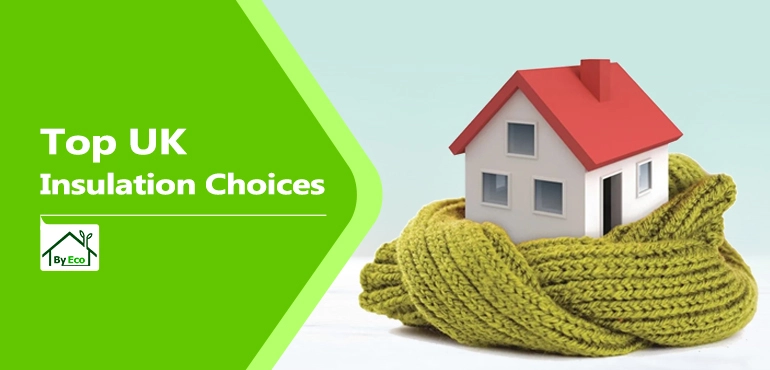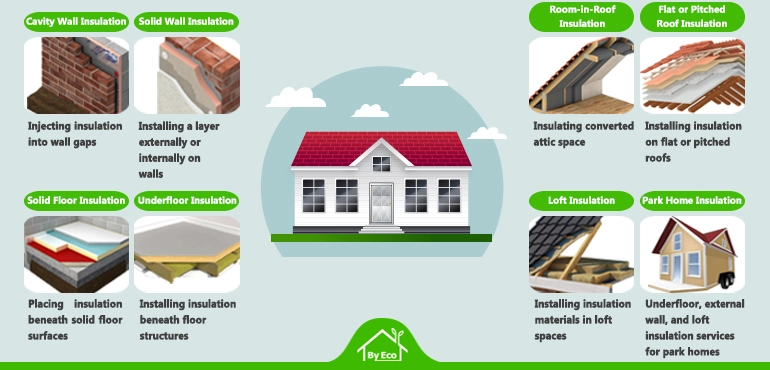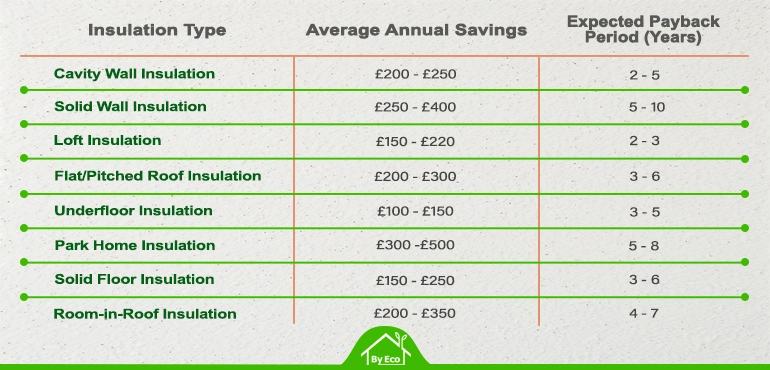Best Insulation For UK Homes

Selecting the right insulation is essential for improving energy efficiency and comfort in UK homes. With the country's diverse climate, it's crucial to identify the most suitable insulation solution. This article provides all the information you need to determine the best insulation solution for your home.
Understanding the Importance of Proper Insulation in UK Homes
Proper insulation is the crucial foundation to making homes energy-efficient and comfortable, especially in the UK where the weather can be unpredictable. Insulation plays a crucial role in maintaining consistent indoor temperatures, reducing heat loss in winter, and preventing excessive heat gain in the summer. Not only does it make living spaces more cosy, but it also helps save money by reducing the need for excessive heating or cooling. Additionally, in alignment with environmental consciousness, proper insulation supports eco-friendly practices by lowering carbon emissions from energy use. Therefore, it's essential for homeowners to prioritise insulation in their homes.
How Government Grants Can Help with Your Insulation Costs
You may be eligible for free insulation solutions through UK government grants, including the Great British Insulation Scheme (GBIS) and the Energy Company Obligation (ECO4) scheme.
The Great British Insulation Scheme (GBIS)
Initiated in April 2023, GBIS aims to deliver cost-effective insulation measures to a broad range of households, focusing on both broader and low-income groups, thereby enhancing access to insulation and contributing to quicker, more effective energy efficiency improvements across the UK.
The Energy Company Obligation (ECO4)
Active from April 2022 to March 2026, ECO4 targets the enhancement of insulation and heating systems in homes across the UK, with a focus on supporting low-income, fuel-poor, and vulnerable households. It facilitates the adoption of energy-saving measures, providing funding for upgrades like cavity wall, loft, and underfloor insulation. This scheme is instrumental in reducing energy bills and carbon emissions, making homes warmer, more comfortable, and environmentally friendly.
Unlocking Free Insulation: Are You Eligible?
Discover your eligibility for free insulation services under ECO4 or GBIS by completing our form. Our partnership with the government ensures that qualifying homes receive the necessary insulation upgrades for free or at a reduced cost.

Steps After Eligibility
- If you're a tenant: we coordinate with your landlord to ensure all contributions and permissions are in place.
- Home Assessment: Our assessors will visit to pinpoint the ideal energy solution for you.
- Scheduling Your Installation:We arrange installation at your convenience, using verified installers to do the job right.
Types of Insulation and Their Benefits
Selecting the right insulation is essential for enhancing your home's energy efficiency and comfort. Each insulation offers specific benefits, addressing different areas of your home from walls to attics.

This section details the advantages of different insulation methods, guiding you towards making an informed choice for a more sustainable and comfortable living space.
Cavity wall insulation: Cavity wall insulation is ideal for homes with cavity walls, as it involves the injection of insulating materials like mineral wool or polystyrene beads to reduce heat loss by filling the gaps in your walls. By doing so, cavity wall insulation dramatically enhances your home's thermal efficiency. The benefits of cavity wall insulation include:
Significant reduction in heat loss, leading to lower energy bills.
-
Improved thermal comfort by maintaining consistent indoor temperatures.
-
Enhanced soundproofing, reducing noise transmission from outside.
-
Prevention of dampness and condensation issues within the walls.
Learn more about Cavity Wall Insulation.
Solid wall insulation: Solid wall insulation is a critical solution for homes without cavity walls, achieved by adding a layer externally or internally to reduce heat loss significantly. This insulation method plays a pivotal role in reducing energy consumption and enhancing living comfort. The benefits of solid wall insulation include:
-
Drastic reduction in heat loss, particularly in older properties with solid walls.
-
Enhanced thermal comfort by creating a more consistent indoor temperature.
-
Potential increase in property value by improving energy efficiency and aesthetics.
-
Protection of the building structure from moisture ingress and deterioration.
Learn more about Solid Wall Insulation.
Loft insulation: Loft insulation is a cost-effective way to prevent warmth from escaping through your roof, ensuring your home stays warm in colder months and cooler during the summer. The benefits of loft insulation include:
-
Substantial reduction in heat loss through the roof, leading to lower heating bills.
-
Improved comfort by maintaining a more stable indoor temperature.
-
Prevention of heat gain in summer, reducing the need for air conditioning.
-
Extension of the lifespan of your roof by minimising temperature fluctuation
Learn more about Loft Insulation.
Flat or Pitched Roof Insulation: Tailored insulation solutions are available for different roof types, ensuring maximum thermal performance for homes with either flat or pitched roofs. Regardless of your roof type, flat or pitched roof insulation optimises the thermal efficiency of your home. The benefits of installing flat or pitched roof insulation include:
-
Enhanced energy efficiency by reducing heat loss through the roof structure.
-
Increased comfort by creating a more consistent indoor temperature.
-
Protection of the roof structure from temperature-related damage and deterioration.
-
Potential improvement in the lifespan of roofing materials by minimising thermal stress.
Learn more about Flat or Pitched Roof Insulation.
Underfloor insulation: Underfloor insulation targets heat loss through floors, which is particularly important for homes with suspended timber floors. This insulation method not only enhances indoor warmth but also effectively reduces heating costs. The benefits of installing underfloor insulation include:
-
Significant reduction in heat loss through the floor structure, leading to lower energy bills.
-
Enhanced comfort by providing a warmer surface underfoot, particularly in colder seasons.
-
Prevention of drafts and cold spots within the home, improving overall thermal comfort.
-
Protection of the floor structure from moisture-related issues and potential damage.
Learn more about Underfloor insulation.
Park Home Insulation: Park homes, especially those built before 2005, often suffer from inadequate insulation. Our comprehensive park home insulation services include underfloor, external wall, and loft insulation (where applicable), leading to significant improvements in warmth and energy efficiency. The benefits of park home insulation include:
-
Drastic reduction in heat loss, making the living space more comfortable and energy-efficient.
-
Enhanced thermal comfort throughout the year, regardless of external weather conditions.
-
Potential increase in property value by modernising insulation standards and aesthetics.
-
Protection of the building structure from temperature-related damage and deterioration.
Learn more about Park Home Insulation.
Solid floor insulation: Solid floor insulation is crucial for homes with solid ground floors, as it involves adding insulating materials beneath the floor to minimise heat loss. It enhances comfort and leads to lower energy bills. The benefits of solid floor insulation include:
-
Substantial reduction in heat loss through the floor structure, resulting in significant energy savings.
-
Improved comfort by providing a warmer surface underfoot, particularly in colder seasons.
-
Prevention of moisture-related issues and potential damage to the floor structure.
-
Potential increase in property value by improving energy efficiency and thermal comfort.
Learn more about Solid Floor Insulation.
Room-in-Roof Insulation: Designed for homes with converted attics or loft spaces, room-in-roof insulation is an effective solution for minimising heat escape, thereby enhancing both comfort and energy efficiency. The benefits of room-in-roof insulation include:
-
Significant reduction in heat loss through the attic or loft space, leading to lower energy bills.
-
Enhanced thermal comfort by maintaining a consistent indoor temperature throughout the year.
-
Prevention of temperature extremes in converted attic or loft spaces, ensuring year-round usability.
-
Potential increase in property value by improving energy efficiency and livable space.
Learn more about Room-in-Roof Insulation.
Our team at ByEco provides tailored recommendations based on a comprehensive assessment of your home, ensuring that the chosen insulation aligns perfectly with your needs.
Saving Expectations
In addition to the thermal benefits, each type of insulation offers potential cost savings over time. Below is a table outlining the average annual savings and expected payback period for each insulation type.

Environmental Impact
Proper insulation not only benefits homeowners in terms of energy efficiency and cost savings but also contributes to environmental sustainability. By reducing the amount of energy needed to heat or cool a home, insulation helps lower carbon emissions associated with energy consumption. This reduction in carbon footprint plays a significant role in mitigating climate change and preserving the environment for future generations.
Additionally, insulation materials that are sourced responsibly and manufactured using eco-friendly processes further minimise their environmental impact. Choosing insulation with high recycled content or opting for renewable insulation materials can further enhance the eco-friendliness of home insulation projects. Overall, prioritising insulation upgrades in homes not only enhances comfort and reduces utility bills but also promotes environmental stewardship and responsible energy use.
Best Insulation Materials
When considering insulation materials for your home, several options offer effective thermal performance and energy efficiency. Each material has its unique properties and benefits, catering to different insulation needs and preferences.
-
Fibreglass: Fibreglass insulation is made from fine glass fibres and is available in batts, rolls, or loose-fill form. It is known for its cost-effectiveness, fire resistance, and versatility. Fibreglass insulation effectively reduces heat transfer and is suitable for various applications, including walls, attics, and floors.
-
Polyurethane (PUR): Polyurethane foam insulation is a high-performance material that provides superior thermal insulation properties. It can be applied as a spray foam, rigid foam board, or foam panel. PUR insulation creates an airtight seal, minimising air leakage and maximising energy efficiency. It is commonly used in cavity walls, roofs, and floors.
-
Polystyrene: Polystyrene insulation, available in expanded (EPS) and extruded (XPS) forms, offers excellent thermal resistance and moisture resistance. EPS insulation is lightweight, easy to handle, and cost-effective, making it suitable for insulating walls, roofs, and floors. XPS insulation is denser and more durable, ideal for below-grade applications and damp environments.
-
PIR Board: Polyisocyanurate (PIR) insulation boards are lightweight yet highly efficient, offering excellent thermal performance and fire resistance. PIR boards have a closed-cell structure, providing superior insulation properties and moisture resistance. They are commonly used in roofs, walls, and floors to achieve optimal energy efficiency and comfort levels.
Choosing the best insulation material for your home depends on factors such as thermal performance, cost-effectiveness, durability, and compatibility with existing structures. Our professional team will guide you toward selecting the most effective insulation solution by conducting a comprehensive assessment of your home. Start your eco-friendly journey with us by filling out our form.
Lifespan of Each Insulation
-
Cavity Wall Insulation: Cavity wall insulation typically has a lifespan of around 40-80 years, depending on the materials used and the quality of installation.
-
Solid Wall Insulation: Solid wall insulation, whether installed internally or externally, can last for several decades, often exceeding 50 years with proper maintenance.
-
Loft Insulation: Loft insulation, including materials such as mineral wool or cellulose, can remain effective for 40 years or more.
-
Flat or Pitched Roof Insulation: Flat or pitched roof insulation, when installed correctly, can last for over 50 years, providing long-term energy savings.
-
Underfloor Insulation: Underfloor insulation, especially when using durable materials like rigid foam boards, can have a lifespan of 50 years or more.
-
Park Home Insulation: Park home insulation, including upgrades to underfloor, external wall, and loft insulation, typically offers a lifespan of 40-60 years.
-
Solid Floor Insulation: Solid floor insulation, depending on the materials used, can last for several decades, with some products lasting over 50 years.
-
Room-in-Roof Insulation: Room-in-roof insulation, when properly installed and maintained, can have a lifespan of 40-60 years.
